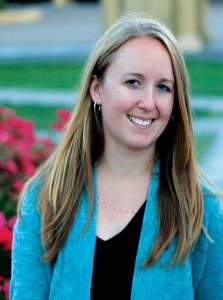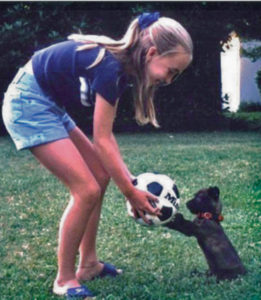
Christine Exley ’09 is using her UMW
economics training to help match
homeless dogs with people to love
them. The Stanford University Ph.D.
candidate graduated from UMW with
departmental honors in economics and
math and received the 2009 Darden
Award for highest grade point average.
Pepper was about to be killed when Christine Exley ’09, then 17, fell in love with the 20-pound pit bull. The dog, shoehorned into a crate, had survived a month − three weeks longer than average − among the constant influx of strays at the animal shelter.
“She never lost her spirit,” Exley said. “I took her home.”
Eight years later, the doctoral student of economics at Stanford University is trying to save dogs on a larger scale. To do so, she’s applying a lesson learned in a freshman economics class at Mary Washington.
Shawn Humphrey, associate professor of economics, taught his students that the discipline could be used to solve real-world problems – and ultimately help make the world a better place.
With so many people looking for pets, and with millions of dogs being killed every year, Exley thought the problem to be solved was in matching them. In early 2012, she and fellow animal-lover Elena Battles started Wagaroo.com, a company that helps bring together dogs and the humans who want them.
But the flood of pets and people who can’t find one another − what Exley called a “massive market failure” − wasn’t the only problem. “No SPCA is related to another SPCA, no humane society is related to another humane society,” she said. “It’s an incredibly fragmented market. It can be hard to find a dog with characteristics you want.”
A clearinghouse for shelters, rescue organizations, and pet owners trying to find responsible breeders and new homes for their dogs, Wagaroo.com allows people to search all of these at once by breed, size, age, gender, and other specifications.
Exley, CEO and chief of research, posted on the company website, “In regard to both economics and Wagaroo, I believe

At 11, Exley played with Lucky, her family’s first rescued dog. Lucky lives with Exley’s parents today, 14 years later.
in testing everything, and then pursuing what works and changing what does not.” That’s something she practiced at UMW.
A four-year Washington Scholar who received the merit scholarship that covers tuition, room, board, and fees, Exley had planned to major only in math. Then Humphrey’s belief that economics could change the world turned her into a double major.
She “fell in love with the economics way of thinking,” she said, and worked in Honduras with Students Helping Honduras (SHH) building roofs on villagers’ homes before the rainy season. When she told Humphrey about SHH and the humanitarian work there, he wanted to lend a hand.
Humphrey collaborated with Exley and SHH. Eventually they established La Ceiba Microfinance Institution, a student-run nonprofit group that provides loans and educational support in Honduras.
“What I was doing at Mary Washington is what graduate students are usually doing at a larger school,” said Exley, who has undergraduate degrees in math and economics.
She believes her hands-on economics experience helped her get into Stanford. She plans to finish her Ph.D. in 2015, and she wants to teach, like Humphrey. “I don’t think there’s anything more rewarding than helping a student on an individual basis,” she said.
But just as much as teaching, and maybe more, Exley said, “I want to save dogs. I want to pursue Wagaroo. I know we don’t have all the answers, but I think we can find a lot of them.”
